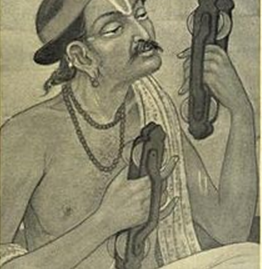Talk:Bhagavān Kṛṣṇa Blesses his Bhakta Puṇḍalika:Sant Narsī Mehtā
By Vishal Agarwal
Narsi Mehtā (born in 1414 CE), a great sant, was born in Junāgadh in the Indian state of Gujarat. He lost both his parents at a very early age. Thereafter, his brother and sister-in-law raised him. His brother loved him dearly, but his sister-in-law was sometimes very harsh with him, tired of his pranks.
One day, Narsi had a fight with another boy and tore his shirt as well as injured him. His sister-in-law got very angry when she heard the complaint and beat him when he returned home. Narsi was terrified and ran into a forest outside his town. In the forest, he took shelter in an abandoned Śiva maṇḍir. He was hungry, tired, alone, and scared. He embraced the śivaliṅga and started chanting the name of Śiva to overcome his fear. This went on for several days.
One night, while he was asleep, he was woken up by a sound. He was startled to see Bhagavān Śiva in front of him, who blessed him also with a darśana of Kṛṣṇa. Narsi was overjoyed to see Bhagavān Śiva and Kṛṣṇa. The latter put a leaf from the Tulsi garland around His neck into Narsi’s mouth. Immediately, Narsi acquired the gift of composing and chanting bhajanas.
A few days later, a family member came in search of him and took him back home. Later in his life, Narsi married and continued to compose and sing bhajanas of Kṛṣṇa. Very often, his bhakti came in the way of a comfortable life, because Narsi was not very interested in earning money. He and his wife were often dependent on his brother and sister-in-law, who continued to trouble him in many ways. But he always treated her with a lot of respect and love, saying that he was forever indebted to her because it was due to her that he had the darśana of Bhagavān.
Story: Narsi Mehtā teaches a lesson to the brāhmaṇa-s
Narsi Mehtā (15th century CE) was a Nāgara brāhmaṇa of Gujarat and he defied caste taboos. He would go to the homes of untouchables and chant religious songs there. He would also accept invitations from them and eat with them. Incensed, his own community excommunicated him.
Once, the brāhmaṇas were invited to a religious feast organized by a high-caste Hindu, but Narsi Mehtā was excluded from the list of invitees. When the brāhmaṇas started eating their food, they got a great shock – each brāhmaṇa saw an untouchable sitting on his either side. The brāhmaṇas realized that the purpose of this miracle was to show them that Narsi Mehtā was a true devotee of Brahman because he had realized that divinity abides within all humans.
The brāhmaṇas repented for their narrow-mindedness. They re-admitted Narsi Mehtā into their community and declared him to be a great devotee.
Sant Narsi Mehtā’s other claim to fame is that he wrote a bhajana that was a favorite of Mahatma Gandhi.
Vaiṣṇava Jana To Bhajana: A favorite of Mahatma Gandhi
| Original Lyrics (Transliterated Gujarati) | English Translation |
|---|---|
| Vaiṣṇava jana to, tene kahiye je
Pīḍa parāye jāṇe re Para duḥkhe upakāra kare toye Mana abhimāna na āṇe re |
Who can be called a true Vaiṣṇava?
It is he who understands the pains, sorrows, and miseries of others and experiences them as his own Who helps to remove others’ miseries without any sense of pride in his mind. |
| Sakala loka māna sahune vandhe
Nindā na kare kāinī re Vāca kāca, mana niścala rākhe Dhana-dhana jananī taṇe re |
Who respects each and every one in this world without prejudice and does not criticize or abuse anyone
Who is steadfast in thought, speech, and action Glory be to the mother who has given birth to such a pious soul. |
| Sama dṛṣṭi ne tṛṣṇā tyāgī
Para-strī jene māt re Jivhā thakī asatya na bole Para-dhana nav jhāle hātha re |
Who regards all equally and has no anger or spite towards anyone
Who gives up all desires of this deceptive world Who considers all women except his own wife as mother Who never utters falsehood and never touches wealth obtained by immoral or dishonest means. |
| Moha-māyā vyāpe nahi jene
Dṛḍha vairāgya jena mana mān re Rāma-nāma śūṇ tālī lāgī Sakala tīratha tena tana mā re |
Who is not entangled by attachment or illusion
Who possesses firm renunciation and remains thoroughly detached from worldly matters Who is wholeheartedly surrendered to Bhagavān Rāma All the pilgrimages and holy places are present within his body because he has become one with Bhagavān. |
| Van-lobhī ne kapata rahita chhe
Kāma-krodha nivārya re Bhane Narsaiyyo tenu darśana kartā Kula ekoṭera tārya re |
Who is free from greed and deceit
Who has conquered passion and controlled anger Bhakta Narsaiyyo says One who is fortunate to have even a sight of such a real Vaiṣṇava is blessed, and his seventy-one generations are blessed too. |


